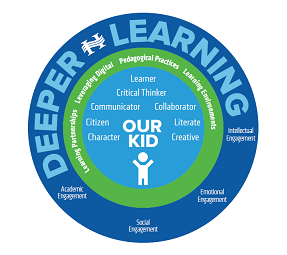“A Fusion of Proven Pedagogical Practices and Emerging Innovative Practices.”
Why Inquiry?
 On the first day of school the students walked into class. The walls were bare. Each desk had only a paper and pencil. The teacher asked all the students to write down any questions they have about their world or about themselves. When one student sheepishly asked: “Can we write silly questions?” the teacher answered that any question about their world or about themselves was fair game. Then they organized all their questions into lists that touched on related themes or ideas. The teacher’s command of the curriculum was such that, at the end of the exercise, the students had recreated the Math, Science, ELA, Social Studies, etc. curricula couched as personal questions. We’ll come back to this.
On the first day of school the students walked into class. The walls were bare. Each desk had only a paper and pencil. The teacher asked all the students to write down any questions they have about their world or about themselves. When one student sheepishly asked: “Can we write silly questions?” the teacher answered that any question about their world or about themselves was fair game. Then they organized all their questions into lists that touched on related themes or ideas. The teacher’s command of the curriculum was such that, at the end of the exercise, the students had recreated the Math, Science, ELA, Social Studies, etc. curricula couched as personal questions. We’ll come back to this.
By now everyone in Hanover School Division has heard of the Deeper Learning Plan and you’ve seen the corresponding visual circle. At the centre is Our Kid; the “Why” of the plan. The second ring focuses on the question of: “How do we achieve Deeper Learning?” That centre ring is composed of the four design elements of Deeper Learning and the one we’re trying to focus on first is Pedagogical Practices; specifically, inquiry/enquiry. There’s a subtle difference in the meaning of inquiry vs. enquiry; that’s why I choose to spell it “enquiry”. It’s a subtle but important difference for me.
Inquiry connotes an investigation where we’ll be officially questioned in a specific process; someone else asks the questions. (“There will be an inquiry into this matter.”)
Enquiry connotes us being curious and asking questions ourselves. (“Let me enquire into that.”) I’m going for that second set of connotations. Regardless of your preferred choice of terminology, in broad strokes, enquiry is comprised of the following three phases: Provoke :: Explore :: Reflect.
It turns out that Enquiry Learning is a powerful pedagogical practice because these three phases align with how people learn. (Watch New Pedagogies? video)
A learning provocation helps to uncover what students already know; their preconceptions, which include both their understandings and their misunderstandings. New learning has to be connected to previous learning in some way and so this is where we start.
In the explore phase we help each other develop rich networked understandings of ideas. Knowledge more closely resembles networks than hierarchies. At a recent PD Day I talked about the idea of 3/4. If you list all the possible meanings of 3/4 it may include fractions, decimals, percents, coins, cakes or pies, ratios, etc.
The way we make sense of these meanings is from the context in which they arise. (Are we sharing a pie? Is there a 75% off sale? Did I owe you a few coins?) Enquiry learning involves making these implied contexts explicit.
Finally, we reflect on what we think we’ve learned. While experience is critical for learning, as John Dewey said, we do not learn from experience, we learn from reflecting on experience. i.e. metacognition.
Let’s revisit that classroom I talked about above. Do you see ways in which the teacher might uncover the students preconceptions? How they might connect ideas together to develop a networked understanding of the curriculum?
We don’t know yet whether or not the students will reflect on their learning. But if they don’t reflect on their learning in some way, neither they nor their teacher will know whether or not they’ve learned it. Reflection helps make learning sticky.
A fusion of proven pedagogical practices and emerging innovative practices.
